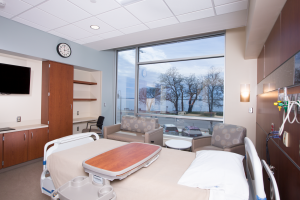It May Sound Odd: ″I Enjoyed Being in the Hospital″
JoAnn B., Glenwood, MN
I came to Glacial Ridge after hip surgery. It may sound odd, but I enjoyed being there. I was most impressed with the staff. Everyone from the kitchen employees to the doctors was very friendly, and everyone seemed happy to be working there. I enjoyed the good care and have already recommended Swing Bed at Glacial Ridge to a woman who is having a hip replacement soon. I had a room that was practically on the lake and every night I saw the sunset reflected on snow and ice. I’m feeling better than I have in two years. I have energy now and love the way I feel.

 Swing Bed provides an extended care option for individuals who are recovering from an injury or illness and are not yet able to care for themselves at home. Glacial Ridge Health System is committed to helping patients focus on healing and getting stronger so they can regain their independence and return home.
Swing Bed provides an extended care option for individuals who are recovering from an injury or illness and are not yet able to care for themselves at home. Glacial Ridge Health System is committed to helping patients focus on healing and getting stronger so they can regain their independence and return home.